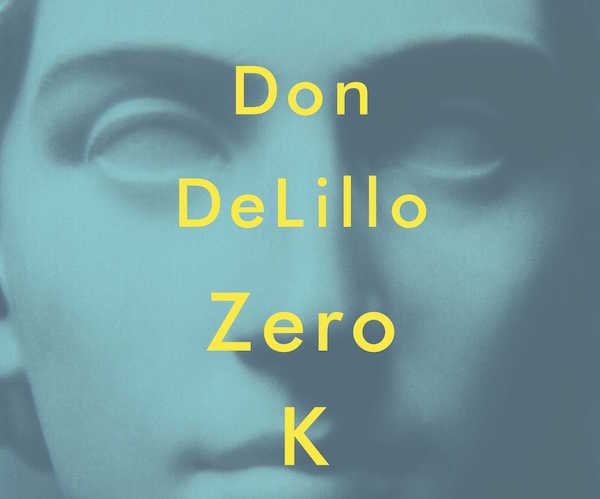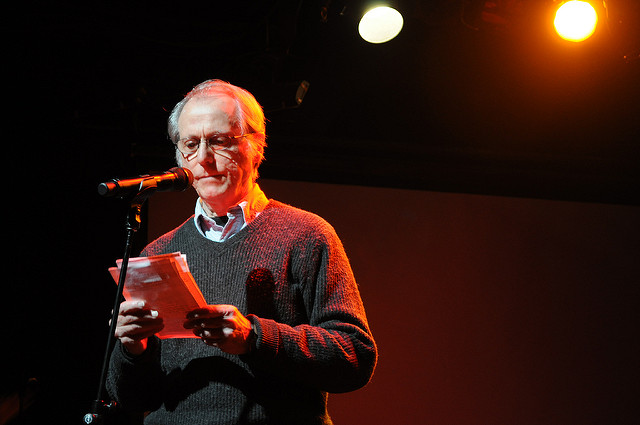Book Review: Don DeLillo’s “Zero K” — The Wages of Cheating Death
Zero K will prove refreshing to Don DeLillo’s readers in that it’s a novel of faith — a concept that he’s always been skeptical of.
Zero K by Don DeLillo. Scribner, 288 pages, $27.00 (Hardcover)

By Troy Pozirekides
Over the last half-century, Don DeLillo has proven to be one of the strongest writers in our language. He has also proven to be one of our strongest writers on language, having undertaken over the course of his career an artistic examination of language and words in their own right. This constant fixation on language has been at times beneficial and at others detrimental to the larger goals of his work, but in Zero K, his first novel in six years, it leads to a fresh avenue of inquiry. While probing formidable subjects — devotion, identity, life and death — the book explores the most extreme depths of language through language. In doing so, it points toward the latent inadequacies that may lurk within a worldview built on words, and shows the possibilities for contentment, even awe, by embracing what cannot be uttered or written.
Zero K follows Jeffrey Lockhart, 34, intellectually ambitious as a boy but who has lately been rendered aimless by his deliberate dive into a series of technical jobs:
“Cross-stream pricing consultant. Implementation analyst—clustered and nonclustered environments. These jobs were swallowed up by the words that described them.”
For Jeff, the point of these jobs is that they are indefinable. Their titles, hyper-specific as they may seem, elude and distract from any real meaning. For a man who, as a boy, fixated on the process of “attempting to define a word for an object or even a concept,” these jobs are a safe haven. They offer a refuge from Jeff’s adolescent goal of breaking down words (from the names for as simple an object as a lint roller to as complex a concept as loyalty or truth) to their most basic elements. As Jeff reflects early on, this was a process “I had to stop before it killed me.”
All this bears on Jeff at the novel’s opening , when he arrives at a facility in the remotest wastes of Uzbekistan “to pay the briefest of visits and say an uncertain farewell” to his stepmother Artis. Her failing health (caused by multiple sclerosis and other ailments) has driven her to decide to cryogenically preserve her body, ahead of her natural death, in an area of a facility called Zero K. With her is her husband Ross, Jeff’s estranged father, a billionaire who funds the technology. Jeff’s visit plays out over the first half of the novel, as Artis makes the final preparations toward preservation and Ross attempts to reconnect with the son he left behind. But outside of a handful of potent exchanges between the three members of this broken family, we mainly watch Jeff; he wanders the facility’s amorphous halls, trying to understand what this place means, to grasp what it promises.
As Jeff identifies soon after arriving, this is not a purely scientific enterprise. Over the entire facility hangs the sober air of devotion, normally reserved for waypoints on religious pilgrimages:
“This place may not have been intended as the new Jerusalem but people made long journeys to find a form of higher being here, or at least a scientific process that will keep their body tissue from decomposing.”
Those in Zero K have pinned their hopes on the Convergence, the mysterious process by which they will be reanimated and acquire near-superhuman abilities. The most profound aspect of the Convergence, as one of the “vital minds” of this “faith-based technology” professes to Jeff, will be the acquisition of “a new language…a language isolate, beyond all affiliation with other languages,” a tongue that “will approximate the logic and beauty of pure mathematics in everyday speech.” It’s at this point that Jeff begins to understand just what those in Zero K are pursuing: not immortality per se but a new, purer way of understanding existence, through “a language that will enable us to express things we can’t express now, see things we can’t see now, see ourselves and others in ways that unite us, broaden every possibility.” To those in Zero K language — as it exists, in all its imprecision and variance — is inadequate. Words fall short of expressing reality. The new, speculative language they hope to acquire will have “no similes, metaphors, analogies” — it will break down, once and for all, the boundary between lived experience and its expression, or so they hope.

Don DeLillo reading in New York City in 2011. Photo: Wiki Commons.
Contemplating this is a lot like trying to wrap your head around the existence of a fourth dimension. Explaining it through language, the limits of which those in Zero K hope to overcome, is especially fraught. But this is a familiar conflict for DeLillo, a writer who has for his entire career walked the tightrope between slavishness to language and commitment to the transcendent power of ideas. The semi-mystical philosophy of Zero K, strange as it may seem, is really just a hyper-attuned version of what has been the driving impetus behind DeLillo’s fiction at least since 1982’s The Names — the idea that language, brought to an impossible point of ferocious purity, can offer us salvation from life’s vagaries, unexpectedness, and dogged imprecisions. But the gospel of Part I of Zero K gives way in Part II to an alternate ideology, one that moves, refreshingly, beyond DeLillo’s customary focus on the power of language.
After Artis is frozen (there’s a beautiful interlude in which we hear her thoughts after death), the setting shifts to Manhattan, where Jeff attempts to return to a degree of domestic normalcy. But after witnessing his father and stepmother’s strange devotion to a technology that they believe will allow them to cheat death, he is forced to reckon with the haphazard way he has lived his adult life. We learn that he’s in a relationship with a woman named Emma; along with her son Stak, the three of them form a family unit that Jeff begins to examine in light of the philosophy of Zero K. And his response is to reject its vision of definitive definition and to embrace the formlessness of his life. Rather than return to isolation as a means of defining himself, as he did as a boy, he comes to realize that it’s community and other murky, messy concepts that give life its sweet savor. Here is how Jeff comes to intrinsically “feel” Emma when she’s not around:
“If I’d never known Emma, what would I see when I walk the streets going nowhere special, to the post office or the bank. I’d see what is there, wouldn’t I, or what I was able to assemble from what is there. But it’s different now. I see streets and people with Emma in the streets and among the people. She’s not an apparition but only a feeling, a sensation. I’m not seeing what I think she would be seeing. This is my perception but she is present within it or spread throughout it. I sense her, feel her, I know that she occupies something within me that allows these moments to happen, off and on, streets and people.”
Moments like this make up the novel’s rich and wonderfully human second half. In it, DeLillo champions the qualities of life that are not neat — such as our bonds with other people — and cautions against our natural desire to pin down the mysterious, whether through language or any other means of control. The tension set up between Zero K‘s governing ideas makes it a resonate and moving read: isolation and regimented precision govern the first part, fellowship and the acceptance of ambiguity the second. (“Without Contraries,” wrote William Blake, “is no progression.”) Ultimately, Zero K will prove refreshing to DeLillo’s readers in that it’s a novel of faith — a concept he’s always been skeptical of — faith in the unspoken, in the unutterable power of collective awe, in the way the reflective gaze of others shapes our individual identity.
Troy Pozirekides is a freelance writer and critic.
